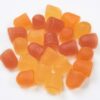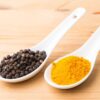Does Turmeric Lower Cholesterol? Know the Current Facts
- Posted on
 Taiba Tariq
Taiba Tariq- Categories: Turmeric Nutrition

Hearing “cholesterol” likely invokes a negative reaction for many. However, it actually helps create necessary elements for your body, such as cell walls and hormones. It’s also used to make bile acids, which help with digestion. High cholesterol levels are a severe health risk and can increase your chances of developing heart disease, particularly clogged arteries. For this reason, many people take statins or other medications to lower their cholesterol levels. You may have also heard that curcumin—the active ingredient in turmeric—can help reduce LDL (bad) cholesterol and raise HDL (good) cholesterol. The question is: Does it really work? If so, how much should you take and how often? Does current research and study support this claim? In this article, we’ll discuss all these queries. So let’s dive into it!
Does Turmeric Lower Cholesterol?
Before we proceed further, you should know what is cholesterol. Cholesterol is a waxy substance made in the liver and circulates in your blood. It’s an essential part of your body’s cells for good health. It helps:
- Builds cell membranes
- Produces hormones
- Absorbs vitamin D
- Releases Bile acids
- It helps your body digest food
- Produces vitamin D for healthy bones
- Aids brain function
As a result of its many positive uses, cholesterol should be considered an essential nutrient!
Risks Associated with High Cholesterol Levels

When there’s too much cholesterol in your blood, it can lead to cardiovascular diseases like heart disease and stroke. These health conditions occur when arteries become clogged with fatty materials such as cholesterol, which reduces blood flow to vital organs like your heart or brain. The other underlying cause may be that when you overeat saturated fat or don’t exercise enough, the liver makes more cholesterol than your body needs—that’s when you get high levels of LDL (bad) cholesterol in your blood. High levels of LDL can lead to many health problems. Turmeric may help lower bad cholesterol and raise good HDL cholesterol, but research should discover the benefits of turmeric for high cholesterol levels.
High or LDL(bad) cholesterol
There are two main types: HDL (good) and LDL (bad). The ratio between both types matters because they affect heart health differently.

HDL (high-density lipoprotein) cholesterol is the “good” cholesterol and is crucial to cardiovascular health. It’s an integral part of your body’s natural cleaning process, helping remove excess cholesterol from the blood and bringing it to the liver for recycling or disposal. Exercise and healthy eating can help raise HDL levels. Smoking increases them, while depression, obesity, diabetes, and high blood pressure lower them.
The problem arises when there’s too much cholesterol circulating in your blood—or if the type of cholesterol you have becomes oxidized because it has become damaged by free radicals due to chronic inflammation from eating a poor diet or not exercising enough (or both). When this happens, LDL (low-density lipoprotein) can accumulate on artery walls and eventually harden into plaque that narrows arteries and causes strokes or heart attacks if not addressed quickly enough by taking steps like adding more lean protein sources into your diet instead of just beefing up on red meat alone every night after work hours end for good reasons like lowering your risk for developing diabetes later down life road which could lead toward needing knee replacements surgery sooner than later.
How Turmeric Lowers Cholesterol:
Curcumin may help lower harmful cholesterol levels. It also may help raise good HDL cholesterol levels. But the spice doesn’t have any effect on triglycerides. High triglycerides are a type of fat that circulates in your blood. High levels of triglycerides are associated with an increased risk for heart disorders and diabetes, per the National Institutes of Health (NIH). Studies have shown that turmeric may help lower triglycerides, but curcumin has not been shown to have any effect on this marker.
The Current Facts
Studies indicate that taking curcumin may raise HDL and reduce LDL cholesterol levels by up to 18 percent. Still, its effects on overall health are unclear. It alone may not be very effective, and if one already has these cholesterol levels, it may not help. When you read the headline, “Curcumin Helps Lower LDL Cholesterol,” it sounds like a miracle. But here’s the thing: that study was microscopic and only included people with high cholesterol levels. The researchers did not look at people who were overweight or had diabetes. And they didn’t look at what other health conditions they might have been suffering from—like high blood pressure or inflammation in the arteries (which can cause plaque buildup).
Turmeric may reduce Inflammation in your arteries that leads to plaque formation.
Inflammation is a normal body immune system response to signs of injury or infection, but it can also be a significant factor in heart disease. It causes blood vessels to swell and inflame, leading to plaque formation. Plaque is a pasty substance. Fat, cholesterol, and calcium deposits form plaque in your arteries that narrow the passageway for your blood flow. If this happens on an artery that supplies blood to your brain or heart muscle, it can result in a stroke or heart attack. Hence, Cholesterol isn’t the only cause of heart disease—inflammation plays an important role too. A random study on animals showed that curcumin could reduce inflammation by inhibiting enzymes called COX-1 and COX-2 (which cause chronic inflammation).
Taking turmeric curcumin supplements may lower inflammation markers in your blood.
You may have heard that curcumin in turmeric has anti-inflammatory effects and can help lower your LDL cholesterol, but that’s not true. Studies show that curcumin alone has a minimal effect on lowering cholesterol levels. The best results come from taking it along with other drugs. (ClinicalTrials.gov) However, there is some evidence that taking turmeric curcumin supplements may reduce inflammation markers in your blood (like C-reactive protein).
Curcumin may help lower bad cholesterol and raise good HDL cholesterol, but more research is needed before it should be considered a treatment for managing high cholesterol levels.
If you’re taking prescription medications to control your cholesterol levels, talk to your doctor before adding curcumin to your treatment plan. Curcumin is not a panacea for high cholesterol. It is an effective supplement alongside other lifestyle changes or medication. Still, it’s less potent than many expect it to be on its own.
How much turmeric should you take to lower cholesterol?
Pick a turmeric supplement with a 150-250 mg dose of curcumin per day, preferably in a 2-capsule serving. This is a safe and adequate daily amount for reducing cholesterol.
Difference BetweenTurmeric and Curcumin
Turmeric has been used for so long in traditional medicine and, more recently, as a herbal supplement. Curcumin is a naturally occurring polyphenol in turmeric (Curcuma longa), used as a spice in Indian and Asian cooking. It is believed to have anti-inflammatory properties, and some research suggests it may help reduce the risk of cancer and heart disease. Many take curcumin as an oral supplement or apply it topically to the skin. Both curcumin and turmeric effects positively on total cholesterol levels.
It’s important to note that we often use these two terms interchangeably; they both refer to a rhizome with bright orange flesh, which our ancestors used as medicine for thousands of years. But there’s much more to know about each plant than its color!
For starters, all strains of turmeric have yellowish-colored roots—like ginger—but they may also have white or black spots or streaks running through them. Curcumin is naturally present within this root; however, you won’t find much in its seeds or rhizomes because it’s precarious when exposed to light and heat.
Side Effects It May Have:
Turmeric and curcumin are usually safe, but nausea, diarrhea, headache, bleeding, digestive issues, dermatitis, and skin allergies may be side effects. Pregnant/breastfeeding should only use it in food. Those with allergies to ginger, cardamom, etc., should avoid it. Curcumin can also cause gallbladder contractions/gallstones, so those with gallstones/obstruction should not use it.
CONCLUDING REMARKS
Although this bioactive substance in turmeric may help lower cholesterol, it’s not a substitute for medication. The health benefits of turmeric are wide-ranging and impressive. In addition to being a potent anti-inflammatory, curcumin helps fight bacteria in your digestive tract and reduces symptoms of depression and anxiety. It also improves memory function in people with Alzheimer’s disease and even helps protect against cancer. However, the question remains: does it help lower cholesterol levels? More research can confirm its beneficial impacts on lowering cholesterol levels. So always ask your healthcare provider before considering turmeric as a treatment for managing high cholesterol levels. We wish you good health!
REFERENCES
Qin S, Huang L, Gong J, Shen S, Huang J, Ren H, Hu H. Efficacy and safety of turmeric and curcumin in lowering blood lipid levels in patients with cardiovascular risk factors: a meta-analysis of randomized controlled trials. https://www.ncbi.nlm.nih.gov/pmc/articles/PMC5637251/ Nutr J. 2017 Oct 11;16(1):68. doi: 10.1186/s12937-017-0293-y. PMID: 29020971; PMCID: PMC5637251.
Curcumin – The Nutraceutical With Pleiotropic Effects? Which Cardiometabolic Subjects Might Benefit the Most? https://www.frontiersin.org/articles/10.3389/fnut.2022.865497/
Turmeric polyphenols: A comprehensive review https://www.oatext.com/turmeric-polyphenols-a-comprehensive-review.php
Microencapsulated curcumin from Curcuma longa modulates diet-induced hypercholesterolemia in Sprague Dawley rats https://www.frontiersin.org/articles/10.3389/fnut.2022.1026890/
Baum L, Cheung SK, Mok VC, et al. Curcumin effects on blood lipid profile in a 6-month human study. Pharmacol Res 2007;56:509-514. DOI: 10.1016/j.phrs.2007.09.013
Alwi I, Santoso T, Suyono T et al. The effect of curcumin on lipid level in patients with the acute coronary syndrome. Acta Med. Indones. 2008;40:201-210. PMID: 19151449
Taiba Tariq
Taiba Tariq is a healthcare nutrition hobbyist, enthusiastic about researching healthcare & skincare news while analyzing the latest and science-backed evidence about nutrition, skin care, and supplements. She wants to help people regain their beauty, health, and well-being through natural means.
all author posts





